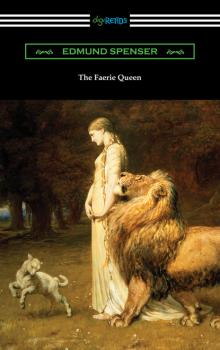Edmund Spenser
Список книг автора Edmund SpenserThe Faerie Queen
Considered to be one of the most difficult poems in the history of the English language, «The Faerie Queen» by Edmund Spenser is a marvelous epic poem depicting the virtues of the legendary King Arthur and his knights in a mythical place called Faerieland. Spenser based his interpretation of the virtues on those named by Aristotle and Thomas Aquinas. Each one of the seven books discusses a different hero who displays one of these virtues; however, this entire collection was meant to be a tribute to Queen Elizabeth and the Tudor family. The stories are intricate and sometimes hard to understand. The language follows Spenserian prose and is intentionally archaic; Spenser wanted his work to have a mythical feel rather than being a modern piece. Each work was specifically chosen to evoke a certain feeling or image, allowing Spenser to make the world of Faerieland have an enchanting feeling. All readers who make their way through the text find that they are rewarded by the epic poem's masterful plots and inventive setting. Many refer to «The Faerie Queen» as early science fiction, since Spenser merges a mystical Faerieland with Arthurian legend. Students of history and literature will enjoy this timeless classic for its challenging rhetoric, but also for its vivid depictions and stunning allegorical significance.
The Faerie Queen
Considered to be one of the most difficult poems in the history of the English language, “The Faerie Queen” by Edmund Spenser is a marvelous epic poem depicting the virtues of the legendary King Arthur and his knights in a mythical place called Faerieland. Spenser based his interpretation of the virtues on those named by Aristotle and Thomas Aquinas. Each one of the books discusses a different hero who displays one of these virtues; however, this entire collection was meant to be a tribute to Queen Elizabeth and the Tudor family. The stories are intricate and sometimes hard to understand. The language follows Spenserian prose and is intentionally archaic; Spenser wanted his work to have a mythical feel rather than being a modern piece. Each work was specifically chosen to evoke a certain feeling or image, allowing Spenser to make the world of Faerieland have an enchanting feeling. All readers who make their way through the text find that they are rewarded by the epic poem’s masterful plots and inventive setting. Students of history and literature will enjoy this timeless classic for its challenging rhetoric, but also for its vivid depictions and stunning allegorical significance. This edition is thoroughly annotated by David Laing Purves.
The Faerie Queen and Other Poems
"The Faerie Queen" is a marvelous epic poem depicting the virtues of the legendary King Arthur and his knights in a mythical land. Edmund Spenser's masterpiece is an intricately woven plot set in an inventive and fanciful setting. Written in appreciation for the Queen this work stands as a major literary achievement. In addition to «The Faerie Queen,» Edmund Spenser also wrote a number of other significant poems. His first major poetical work «The Shepherd's Calendar» begins this collection of his other poems. An emulation of Virgil's «Eclogues,» «The Shepherd's Calendar» depicts the life of shepherd Colin Clout through the twelve months of his year. The twelve eclogues of the poem, each named after a different month, discuss abuses of the church, offer praise for Queen Elizabeth, and reveal the struggles of a lonely shepherd. Also included in this edition of Spenser's poetry are the following poems: «The Ruins of Time,» «Prosopopoia,» «Muiopotmos,» «Colin Clout's Come Home Again,» «Amoretti,» and «Epithalamion.»
Selected Shorter Poems
Although known best for his sweeping allegorical epic «The Faerie Queen,» Edmund Spenser wrote a number of other significant poems. His first major poetical work «The Shepherd's Calendar» begins this collection of his «Selected Shorter Poems.» An emulation of Virgil's «Eclogues,» «The Shepherd's Calendar» depicts the life of shepherd Colin Clout through the twelve months of his year. The twelve eclogues of the poem, each named after a different month, discuss abuses of the church, offer praise for Queen Elizabeth, and reveal the struggles of a lonely shepherd. Also included in this edition of Spenser's poetry are the following poems: «The Ruins of Time,» «Prosopopoia,» «Muiopotmos,» «Colin Clout's Come Home Again,» «Amoretti,» and «Epithalamion.»
The poetical works. Vol. 7
Полный вариант заголовка: «The poetical works of Edmund Spenser : Vol. 7 : in 8 volumes : from the text of Mr. Upton, &c. : with the life of the author».
The poetical works. Vol. 3
Полный вариант заголовка: «The poetical works of Edmund Spenser : Vol. 3 : in 8 volumes : from the text of Mr. Upton, &c. : with the life of the author».
The poetical works. Vol. 6
Полный вариант заголовка: «The poetical works of Edmund Spenser : Vol. 6 : in 8 volumes : from the text of Mr. Upton, etc. : with the life of the author».









